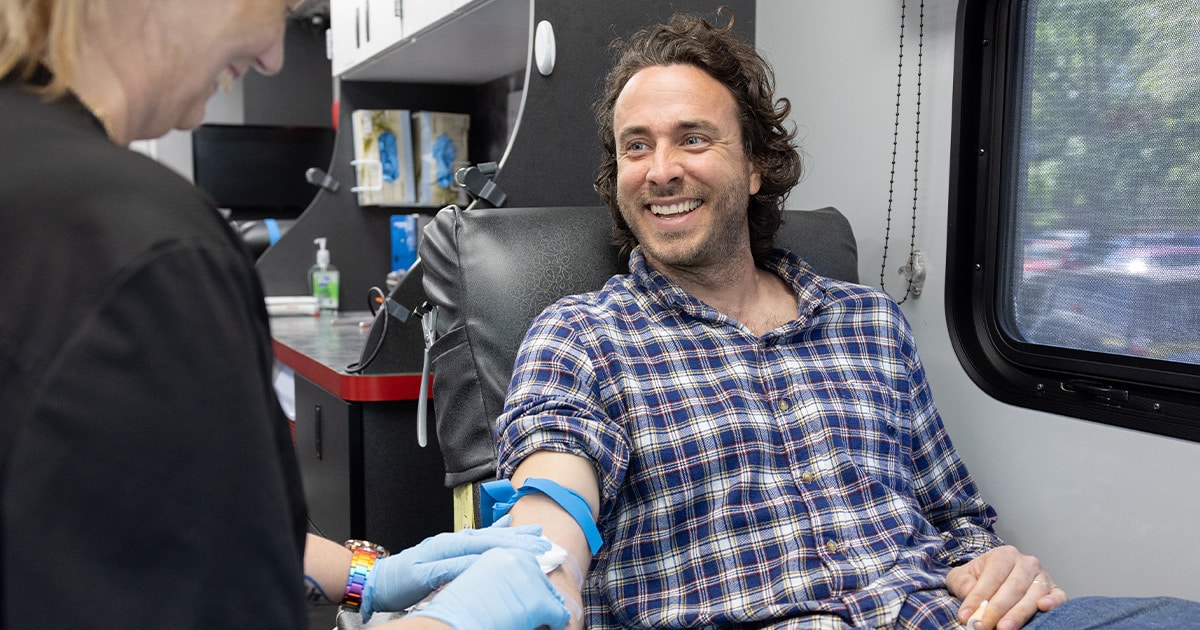
What Men Need to Know About Giving Blood
People have a lot of questions about donating blood.
- Will donating blood make me sick?
- Can I give blood if I’m a vegetarian?
- Can I donate if I’m on [insert medication here]?
It’s only natural for people to wonder whether they’re eligible to donate blood and how the process will affect them. Today, we’re going to address a few of the questions that usually come from our male donors. Men, guys, fellas, dudes … you’ve got questions. We’ve got answers.
Does donating blood lower testosterone levels?
Many men wonder if giving blood will lower their testosterone levels – and the answer here is simple: Nope, it won’t long term. There are no associations between blood donation and lower testosterone levels. That being said, if testosterone levels are a concern, we certainly recommend following up with a physician.
Does giving blood impact cardiovascular health?
While cardiovascular events are scary for both men and women, men tend to be at a higher risk. How much higher? Between 70% and 89% of sudden heart attacks happen in men. There are numerous reasons why this is the case, but the fact remains that heart health is important, and one surprising way that men (and women) can improve their cardiovascular health is by giving blood regularly. Why is that? Good question.
Donating blood reduces blood viscosity. Blood viscosity can be a reliable predictor of a cardiovascular event in a patient. The thicker and stickier blood is, the more friction there is in blood vessels. This friction can cause damage and contribute to the possibility of a cardiovascular event. Giving blood can reduce the viscosity of a patient’s blood, reducing the potential damage to their blood vessels.
A study published by the Journal of the American Medical Association (JAMA) backs up this idea. The study found that participants between the ages of 43 and 61 had fewer heart attacks and strokes when they donated blood once every six months. This is great news! These findings suggest that donating blood not only helps others but can also benefit your personal health. It is important to note though: to maintain proper cardiovascular health, it is also essential to lead a healthy lifestyle that includes regular exercise and a balanced diet. If you are healthy, that also makes you eligible to donate blood in the first place.
Can donating blood burn calories?
Did you know donating blood will burn calories? Yep, it’s true! A study from the University of California San Diego found that blood donors burn an average of 650 calories per session. While this is something that both men and women can benefit from, men may especially be interested in burning a few extra calories as statistics show that men tend to be more overweight than women — 33% of men compared to 25% of women.
Of course, giving blood shouldn’t be the only tool people use to burn calories for weight loss. Just as with maintaining heart health, it is also important to exercise regularly and eat a well-balanced diet when trying to lose weight.
Does being a blood donor reduce cancer risk?
There is no single factor that determines someone’s cancer risk; however, donating blood can reduce the risk of at least one contributing factor.
Donating blood can reduce iron in the body, and the reduction of iron stores is linked to a lower risk of cancer, according to The Journal of National Cancer Institute. Iron is thought to increase free-radical damage in the body, and this damage has been linked to a higher risk of cancer and aging. Since men are more likely to get cancer than women, this is certainly a factor to consider when setting up an appointment to donate blood.
Donating blood has more upsides than most people think. Not only can you save up to three lives with just one donation, giving blood also has many benefits for your health. To learn more about donating blood or to find a TBC location near you, visit our website or contact us. We would love to hear from you!

